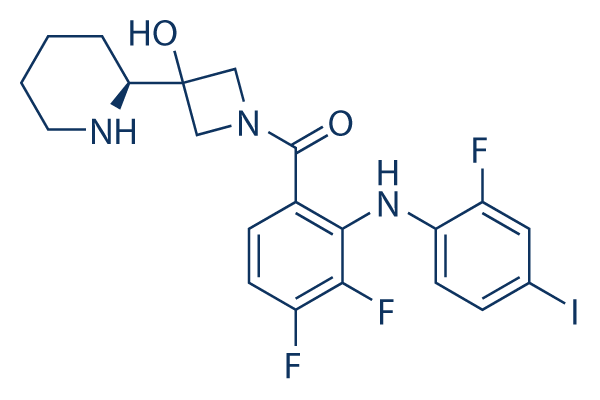Pronunciation KOE-bi-ME-ti-nib AHFS/Drugs.com Monograph Pregnancycategory AU: D Protein binding 95% | Trade names Cotellic MedlinePlus a615057 Molar mass 531.3 g/mol | |
 | ||
License data EU EMA: CotellicUS FDA: Cobimetinib Route Oral administration (Tablet) | ||
Cobimetinib and atezolizumab in colorectal cancer
Cobimetinib (trade name Cotellic) is a MEK inhibitor developed by Exelixis and Genentech (Roche). It is used in combination with vemurafenib, a BRAF inhibitor, to treat melanoma. In November 2015, the U.S. Food and Drug Administration approved cobimetinib for unresectable or metastatic melanoma with a BRAF V600E or V600K mutation, in combination with vemurafenib (Zelboraf). Cobimetinib is not indicated for treatment of patients with wild-type BRAF melanoma.
Contents
- Cobimetinib and atezolizumab in colorectal cancer
- Cobimetinib plus vemurafenib for advanced braf mutated melanoma
- Medical use
- Adverse effects
- Clinical trials
- References
Cobimetinib in combination with vemurafenib is reportedly priced at $17,600 per month, or about $211,000 per year.
Cobimetinib plus vemurafenib for advanced braf mutated melanoma
Medical use
Cobimetinib is approved for use in combination with vemurafenib (Zelboraf) for the treatment of advanced melanoma with BRAF mutation (either V600E or V600K) that cannot be removed by surgery or which has metastasized.
Adverse effects
Common adverse effects observed in cobimetinib and vemurafinib co-treated persons in clinical trials included diarrhea, nausea, vomiting, rash, photosensitivity, and pyrexia.
Clinical trials
Cobimetinib was awarded orphan drug status by the FDA for malignant melanoma with BRAFV600 mutation in 2014.
Acquired resistance to BRAF inhibitors, such as vemurafenib and dabrafenib, commonly occurs after a several months of progression-free tumor response. Preclinical data indicated the involvement of MAPK pathways and MAPK-independent signaling in the developed resistance, suggesting dual inhibition of MEK and BRAF kinase as a strategy for increasing the longevity of tumor response seen with BRAF inhibition alone.
In phase III clinical trials, the combination of cobimetinib and vemurafenib was tested in patients with BRAFV600-mutated metastatic melanoma, which resulted in significant improvement in progression-free survival in patients, but also produced some increase in toxicity. The combination increased progression-free survival to an average of 12.3 months, compared to 7.2 months for vemurafenib alone. This clinical data also showed that the combination treatment resulted in 65% survival rate of patients 17 months after beginning the treatment, increased rates from the 50% of patients on vemurafenib treatment alone. Adding cobimetinib also increased the median overall survival to 25.6 months, compared to the 18 months for vemurafenib alone.
Another phase III trial is comparing cobimetinib with atezolizumab and regorafenib for treament of advanced colorectal cancer.
Roche has announced a planned phase III trial of atezolizumab in combination with cobimetinib and vemurafenib for BRAF-mutated melanoma. A phase II trial of cobimetinib with vemurafenib for melanoma with brain metastases was terminated in 2016. Cobimetinib in combination with paclitaxel is in a phase II trial for the treatment of metastatic triple-negative breast cancer.
